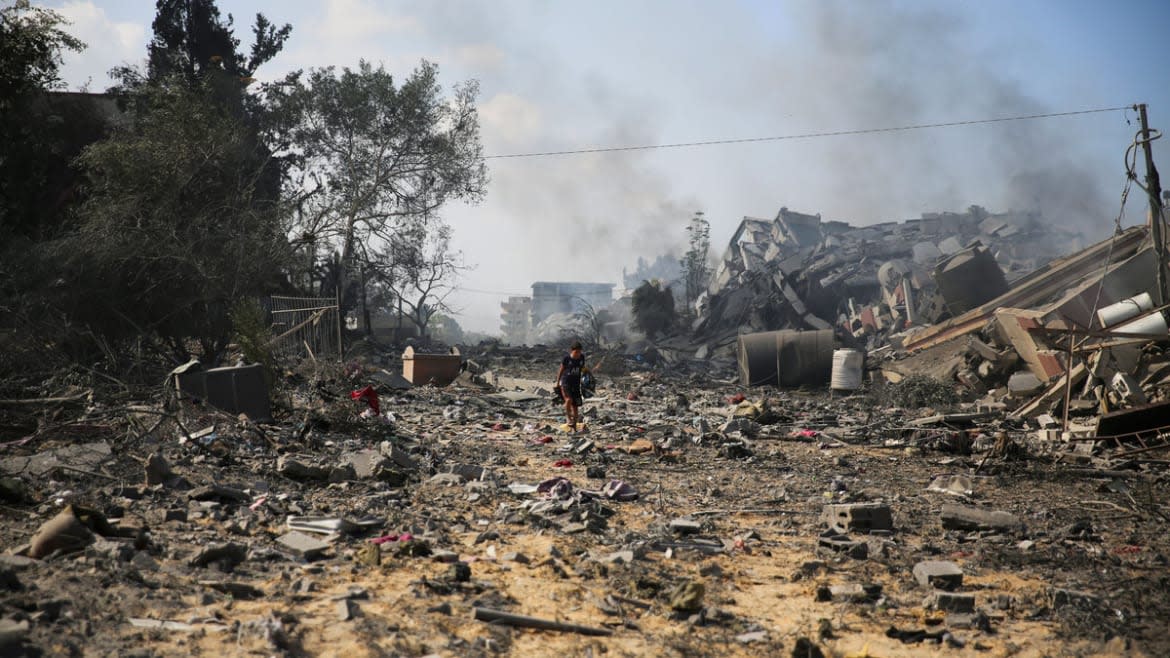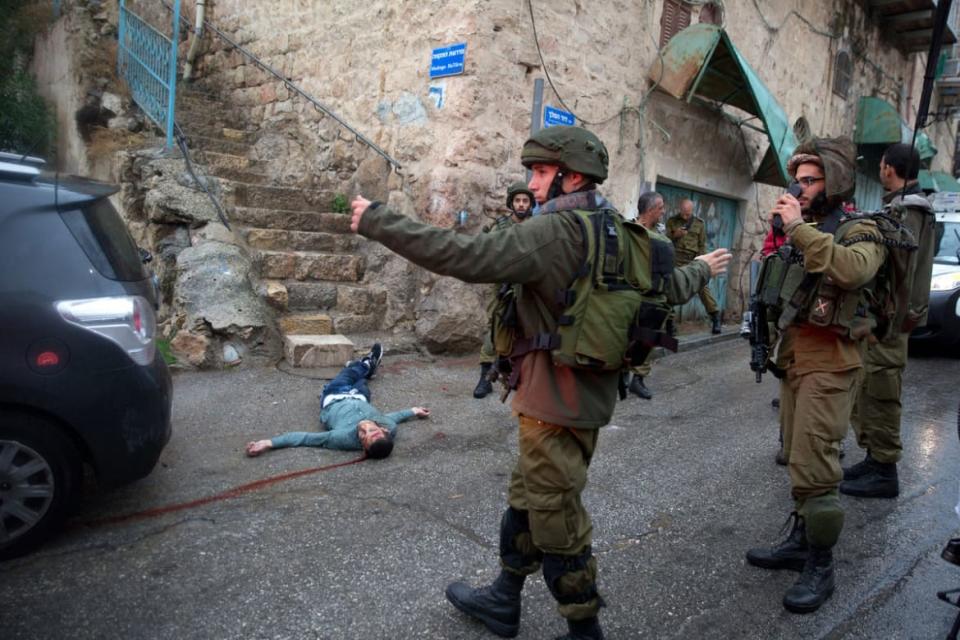A Ground Invasion of Gaza Will Not Make Israel Safer

In the summer of 2015, the UN Department of Safety and Security reassigned me from “Mogadiscio” to the “Palestinian Territories, Occupied.” Back then, United Nations reassignment letters adhered to the International Civil Service Commission’s Editorial Manual, hence the outdated spelling and reference to long-ignored resolutions of international law.
I’d done well in Mogadishu, Somalia, and this was an intimidatingly bigger job that included security oversight for East Jerusalem, the West Bank, and Gaza, as well as the organization’s oldest peacekeeping mission—the UN Truce Supervision Organization (UNTSO).
Mogadishu had been my second non-family posting—UN parlance for an assignment where spouse and dependents cannot join you at the duty station—and both were great for my career, but not so much for my marriage. After three years of ferrying between Somalia and Kenya (four weeks in, one week out), my wife Iryna and I looked forward to a more stable family situation in Jerusalem.
Every Option for Israel in Gaza Is Bad
We found an apartment in the city’s North Talpiot neighborhood, within walking distance of UNTSO headquarters. The apartment’s modern facade did little to mask the shoddy workmanship (from loose doorknobs to bizarrely inaccessible light switches) of a building thrown up in a hurry.
But you couldn’t beat the location. Sandwiched between Israeli and Palestinian neighborhoods on Haas Promenade and close enough to the Old City to witness firsthand how Jerusalem’s terrestrial realities jar with her celestial mystique. Revered by the three Abrahamic faiths, the capital of two warring tribes, and a singular archeological curiosity without one uncontested stone, it’s hard not to wax poetic about a neighborhood that somehow exists in both heaven and earth. On a clear day, the view from our apartment stretched from Al Aqsa’s golden domes all the way to Jordan—eerie in its brilliance.
After a few weeks, our Kenyan mutt Sunny joined us in Jerusalem, and we began dragging our ten-year-old daughter and four-year-old son on long walks along the promenade. Despite the name, Haas Promenade is one place that neither side can completely claim. A park where we were just as likely to encounter a Palestinian family picnicking, as an Israeli youth group hosting a field day. Either way, Sunny—with her Rottweiler’s build and Labrador’s disposition—lapped up attention from the kids, and I earned grins with enthusiastically butchered greetings in Hebrew and Arabic.
Israel’s War Isn’t Against Hamas—It’s on the Palestinian People
But the same faces that smiled in our direction scorned each other as if national injuries had been inflicted yesterday. Our expatriate bubble may have shielded us from the city’s injustice, but it didn’t obscure it. During our 15 months in Jerusalem, the muezzin’s call melded into the background of our days, while the hiss of teargas canisters foregrounded the worst nights.
That autumn, we witnessed many bad nights.
I’d expected some. My Palestinian national staff—trained to forecast clashes like inclement weather—warned me that the period of the Jewish autumn holidays was consistently tense.
Still, the spate of stabbings of Israeli cops and settlers in the autumn of 2015—dubbed the “Knife Intifada” by the Facebook generation—took everyone by surprise. Characterized by their uncoordinated nature, the latter half of 2015 saw on average three such “lone wolf” attacks per day—mostly carried out by young Palestinian men unaffiliated with any political or religious faction.

Occasionally during this ten-month blip in the decades-long occupation, one of the attackers would fatally slash a cop or settler in an inspired first swipe. Then, the Palestinian got shot. Around the office, my staff took to calling the attacks “suicide stabbings.”
In preparation for my weekly briefings to the UN Security Management Team, I poured over reports detailing the attacks and grilled my staff for details. I began to recognize the type behind the stabbings.
The type who could explain the precise combination of fuel, saltpeter, and machine oil for the best Molotov cocktail; the type who knew the inside of room #4 in the Russian Compound—a prison dating back to the British Mandate, now used for harsh interrogation of Palestinians by Israeli forces—better than their school library; the type whose hearts had no more room for fear and so led lives of near-death experiences: stoning armored personnel carriers, fucking, and smoking hash on the weekends. The type of Palestinian boys that tended not to live long.
Most of the stabbings remained alleged—the Israeli government rarely released CCTV footage of the events—but a Palestinian always ended up getting shot, often under circumstances that amounted to summary executions. The increased Israeli security force patrols through Haas Promenade did not make me feel safer.
Just after Sukkot, my sister-in-law came to visit. On the evening of Natasha’s arrival, we took her for a stroll on the rain dampened promenade.
A fireteam of Israeli Border Guards in full battle rattle approached us on the lawn and Sunny—who, by this time, considered the promenade her backyard—reacted aggressively.
The lead cop stutter-stepped and slipped onto the grass. His buddies laughed.
From his ass, the cop lifted his rifle and addressed me in English.
“I’ll shoot your dog.”
“Calm down, son.” Sunny sat next to my foot, the ruddy streak between her ears raised.
Thenmy daughter burst into tears, and the cop lowered his weapon.
He was a good-looking young man, with thick, dark hair and brooding eyes that reflected real shame when they met mine. He was tired, frustrated, and might have lost friends to the attacks that held little more than academic interest for me.
Nonviolence Is the Missing Path to Israeli-Palestinian Peace
Lately, I’ve found myself thinking of that young man quite a bit. I imagine thousands like him—vengeful, tired, and afraid—entering Gaza City.
A densely populated open-air prison where the house-to-house fighting will resemble the worst of Fallujah and Hue City, only exacerbated by an elaborate network of tunnels. The sort of fighting where troops spread out in pockets, often without officer or non-commissioned officer supervision. Situations where only the thinnest threads of humanity restrain young men from horror. For troops seeking revenge, civilians replace the enemy.
I won’t pretend to be unbiased, but endeavor to be clear: a ground invasion of Gaza does not make the state of Israel more secure. Very much the opposite.
When a powerful community subjugates a powerless one, terrible things are revealed.
Get the Daily Beast's biggest scoops and scandals delivered right to your inbox. Sign up now.
Stay informed and gain unlimited access to the Daily Beast's unmatched reporting. Subscribe now.

